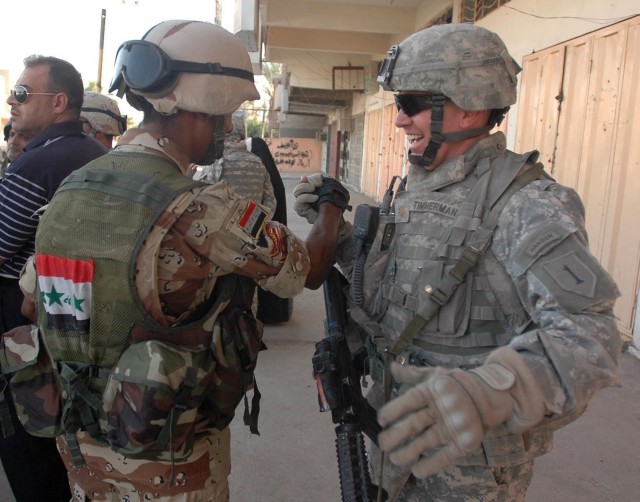BAGHDAD, Iraq Nov. 8, 2007 -- It has been 15 months since the Soldiers of U.S. Army Europe's 1st Battalion, 18th Infantry entered a combat zone, answering their nation's call to serve.
Now, the Army has one message for the Schweinfurt, Germany-based Soldiers: Mission complete.
The Soldiers of 1-18th -- the "Vanguards" -- are set to return to Schweinfurt this month after having been deployed since August 2006. The unit is part of the 2nd Brigade Combat Team, 1st Infantry Division, USAREUR's first brigade to complete a 15-month tour following the Army's decision to extend combat tours from 12 to 15 months.
The deployment was long and full of challenges,said "Vanguards" Command Sgt. Maj. Israr Choudhri, but thought of his daughter safe at home made it all worth it.
"It was worth it, because every day she went to school, I never worried that someone would attack my wife's car with an (improvised explosive device) or (rocket-propelled grenade)," he said. "In order to prevent that from happening to any one of our kids, if I was in Iraq for 15 months, it was all worth it."
Maj. Eric Timmerman, the operations officer for Task Force Vanguard, said he volunteered to join the unit after it had already deployed because he felt it was worth it as well.
Timmerman, who had already served as a battalion-level operations officer, actually worked with 1-18th in training the Soldiers to deploy, and he said being with the troops was one reason he volunteered to be in the position again.
"Believe it or not, once you get to a certain rank, you spend a lot of time on the staff side of things, often very removed from everyday combat Soldiers, and you miss that because really that's kind of why I came in," he said. "It was an opportunity for me, so I jumped at that opportunity."
Choudhri, who initially deployed as a first sergeant with a military intelligence company in Samarra and Mosul, says it has always been about the Soldiers.
"My job as a first sergeant was about taking care of Soldiers," he said. "Now, as a battalion sergeant major, the duty does not change -- taking care of Soldiers."
But the challenges are not over for the troops of the 1-18th. Now they must return home to convey what they've been through here in terms that their families will understand.
Timmerman says his father, who served in Vietnam, taught him how to tell his three sons, ages 9, 11 and 13, about the trials and triumphs he and his troops endured here.
"I remember he never really talked a whole lot about it. With my sons, I think for each one of them I'm going to have to sort of talk about things in a different manner. That will evolve over time as they get older," he said. "I'm not going to talk about the horrors of war with them at such an early age, but they need to know that. I want to be able to paint the experience on the good and the bad side as truthfully as possible."
Timmerman said one of the most difficult things to get his family to understand will be the conflict going on in Iraq.
"There's a whole range of dimensions of things you do, from killing to handing out school books," he said. "I want them to know that we came over here, and we did some killing, some killing was done to us, and that wasn't pretty. When that had to happen, often, other people were affected immediately. The family, somebody else was hurt. It's not as clean as shoot and kill, bad guy down, done."
Timmerman said he also feels it is important for his kids to understand the versatility of America's fighting forces.
"I think their country has trained an Army to be able to go and do these things that I don't think any other army in the world really does to the extent that we do, or takes the amount of care we do to fix a school; to deliver school books and desks; to get packages from family members; and distribute those items to kids on the street -- to try and have a positive outcome to this thing that we're doing," he said.
Ultimately, Timmerman said his troops' ability to react to the complex set of circumstances they faced every day in Baghdad's Rashid District is a point of pride.
"War isn't like a movie. War isn't like 'Band of Brothers' There're so many more dimensions to it. By us being here, in probably one of the most violent places in all of Iraq, we touched a lot of people and we made a difference. We always sought ways to go about helping people.
"Even though we had our game faces on every day and we were ready to deal death, our Soldiers are good enough nowadays they can almost turn on and off like a switch. That's an incredible testament to the guys that are wearing this uniform at all levels. We have a lot to be proud of. I attribute that to discipline and the leadership that we have in this organization. The desire to make every place we went better every time was always there."


Social Sharing